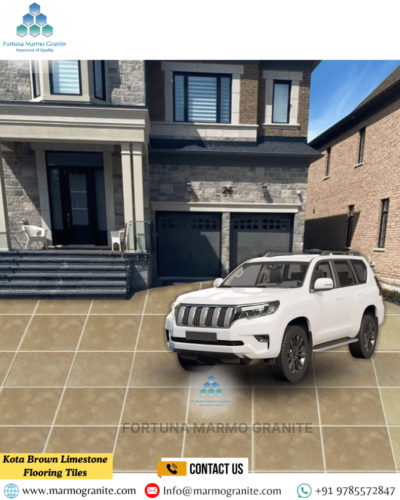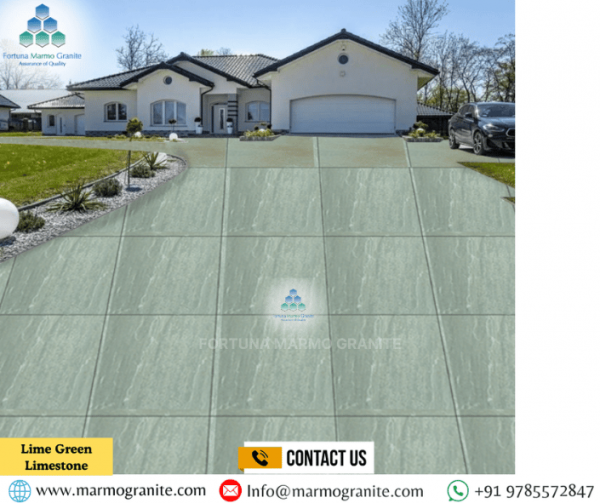Limestone Facade Tiles for Modern Villas: Timeless Elegance Meets Contemporary Design
Limestone Facade Tiles for Modern Villas Modern architecture, celebrated for sleek minimalism, innovative materials, and functional design, continues to reshape skylines with bold, forward-thinking projects. Yet, as designs become increasingly futuristic, there is a growing desire to incorporate elements that add warmth, texture, and a sense of rootedness. Limestone facade tiles meet this need perfectly. In contrast, Their organic tones, tactile surfaces, and historical legacy introduce an earthy elegance that complements modern aesthetics beautifully.
Moreover, In today's design landscape, limestone is more than just a material—it represents a philosophy. Yet, It blends permanence with innovation and beauty with practicality. In addition, This blog explores why limestone facade tiles are increasingly popular in contemporary villa architecture, highlighting their design flexibility, structural benefits, and the timeless visual appeal they bring to some of the world's most striking homes.
Why Choose Limestone Facade Tiles for Your Modern Villa?
Unparalleled Aesthetic Versatility: A Spectrum of Sophistication
One of limestone's most compelling features is its remarkable aesthetic versatility. Far from a single grey tone, limestone appears in a stunning range of hues—from pristine whites and creamy beiges to warm golds, subtle grays, and deep charcoal. This natural palette allows architects and designers to choose the perfect shade to complement a villa's overall design, surrounding landscape, and intended atmosphere.
The available finishes further enhance limestone's appeal. Honed finishes provide a smooth, matte look that feels sophisticated and understated, ideal for minimalist designs. Bush-hammered or sandblasted finishes create textured, rustic surfaces, adding depth and character. Polished finishes, meanwhile, bring out a subtle sheen, highlighting the stone's inherent beauty. With such variety in color and finish, limestone can seamlessly suit diverse architectural styles, from sharp, geometric forms to organically inspired designs.
Enhancing Biophilic Design: Connecting with Nature
Modern villa designs often emphasize biophilia—the natural human desire to connect with nature. Limestone, as a natural material, perfectly supports this principle. Its organic origins and subtle imperfections bring a piece of the earth into the built environment, creating a sense of calm and well-being.
When used on facades, limestone establishes a tactile and visual connection to nature. Sunlight interacts with its surface, casting shadows and highlighting textures, producing a dynamic appearance that changes throughout the day. This natural interplay helps create living spaces that feel harmonious, grounded, and fully integrated with their surroundings.
Exceptional Durability and Longevity: An Investment in Permanence
Moreover, A modern villa represents a significant investment, and the materials you choose should reflect this commitment to longevity. Limestone stands out for its exceptional durability. This robust material withstands harsh climates, from intense sun and heavy rain to freezing temperatures. Its natural strength resists cracking, chipping, and fading, ensuring your villa's facade retains its beauty for decades with proper care.
In addition, This durability also reduces the need for frequent maintenance or replacement, offering long-term cost savings. By choosing limestone, you invest in both the enduring beauty and structural integrity of your villa, securing peace of mind and enhancing its lasting value.
Thermal Performance and Energy Efficiency: A Sustainable Choice
Yet, Beyond its beauty and durability, limestone offers practical thermal benefits. Its natural density provides excellent insulation, helping regulate interior temperatures. In warm climates, it reflects sunlight and absorbs heat, keeping the villa cooler. In colder regions, it helps retain warmth. This thermal mass reduces reliance on artificial heating and cooling, lowering energy consumption and supporting a more sustainable footprint.
In today's environmentally conscious world, choosing limestone aligns with sustainable design principles. Its natural origin and long lifespan make it a responsible choice for modern villas seeking high environmental performance.
Designing with Limestone Facade Tiles: Creating Architectural Masterpieces
- Integration with Other Materials: A Symphony of Textures
Moreover, Limestone pairs beautifully with a variety of other contemporary materials. Its natural warmth and texture create an appealing contrast with sleek glass, industrial steel, and smooth concrete. Imagine a villa where expansive glass panels reflect the sky, framed by strong, honest limestone walls, or where a striking steel entrance is softened by the earthy tones of the stone facade. This interplay of materials creates visual interest and depth, elevating the overall design.
- Laying Patterns and Grout Lines: Subtle Nuances, Big Impact
In addition, The way limestone tiles are laid can significantly influence the facade's appearance. Large format tiles create a sense of grandeur and modernity, emphasizing the stone's expansive beauty. Smaller, more modular tiles can introduce a rhythmic pattern. The choice of grout color and width also plays a crucial role.
- Lighting Design: Illuminating Natural Beauty
Yet, Effective lighting can transform a limestone facade, especially at night. Uplighting can highlight the stone's texture and natural variations, creating dramatic shadows and a sense of depth. Grazing light can emphasize its subtle imperfections and the inherent beauty of the material. Strategic lighting not only enhances the villa's nighttime presence but also brings out the unique character of the limestone, making it a focal point even after sunset.
- Landscaping Harmony: Blending Indoors and Outdoors
Consequently, The natural aesthetic of limestone makes it an ideal material for creating seamless transitions between indoor and outdoor living spaces. Continuing the limestone facade into exterior walls, garden features, or even paving stones can blur the lines between the built environment and the natural landscape.
Conclusion
In conclusion, limestone facade tiles symbolize refined beauty and architectural excellence. They effortlessly blend timeless elegance with contemporary design. Their natural charm and exceptional durability make them ideal for modern villas, where aesthetics, functionality, and sustainability matter. Consequently, Subtle color variations and soft textures allow limestone to complement a wide range of exterior elements—from glass and metal to wood and concrete—creating a cohesive and sophisticated facade. limestone tiles offer architects and homeowners limitless possibilities to create sophisticated, serene, and visually striking façades.



